Why Health Benefits Are Greater with Vitamin D3 and K2 Together
Table of Contents
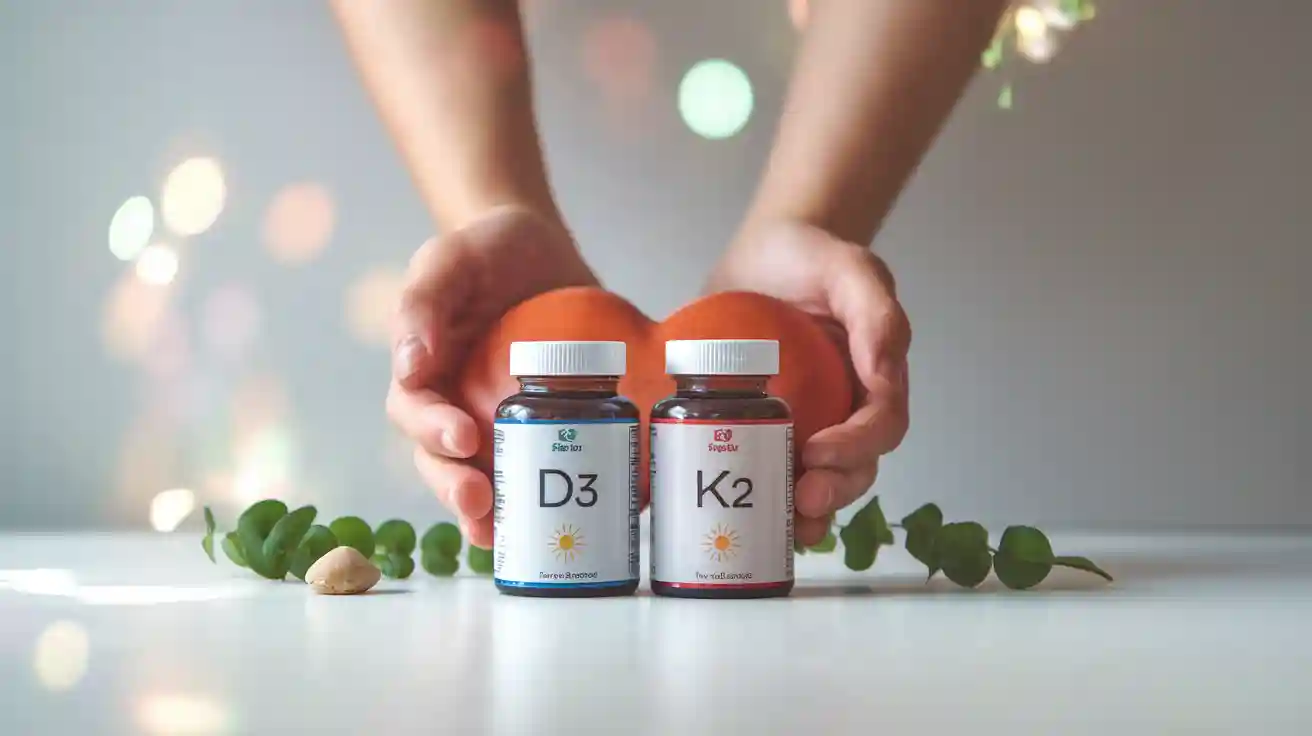
Combining vitamin D3 and K2 creates a powerhouse combination packed with health benefits. You get stronger bones, better heart protection, and extra support for your immune system. Vitamin D3 helps your body absorb calcium, while K2 directs it to your bones and away from arteries, reducing the risks linked to vitamin D deficiency. Clinical studies show that this duo improves bone fusion and supports heart health more than D3 alone.
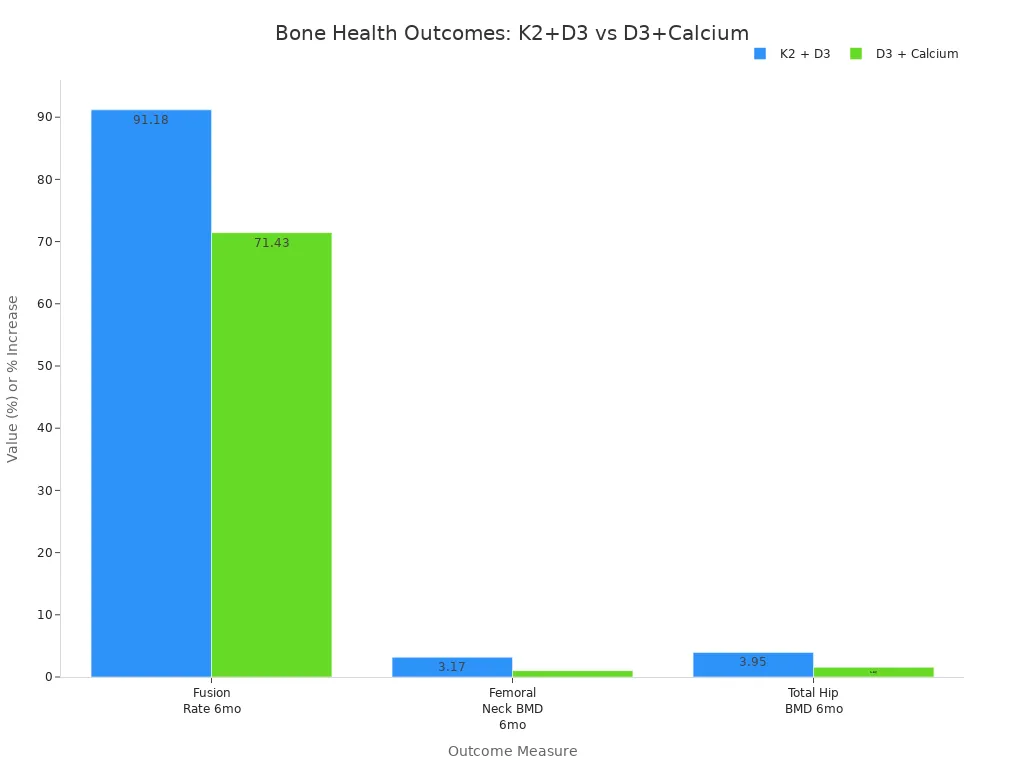
The combined health benefits of D3 and K2 extend beyond bones and heart, offering metabolic and immune support for overall well-being.
Vitamin D3 and K2 Roles
Vitamin D3 Functions
You need vitamin d3 for many important processes in your body. This nutrient helps you absorb calcium from your food and keeps your bones strong. When you get enough d3, your body can use calcium to build and repair bone tissue. Without enough vitamin d3, you may develop weak bones or even osteoporosis.
Here is a table that shows the main roles of vitamin d3:
| Biological Role | Description |
|---|---|
| Skeletal Health | Regulates calcium and phosphate for strong bones and teeth. Deficiency leads to weak bones. |
| Immune Modulation | Supports your immune system and helps control inflammation. |
| Cardiovascular Function | Helps keep your heart healthy by lowering blood pressure and supporting blood vessels. |
| Neuroprotection | Protects your brain cells and may help with memory and learning. |
| Metabolic Regulation | Supports healthy blood sugar and insulin levels. |
| Skin Health | Helps your skin heal and stay healthy. |
| Cancer and Autoimmune Diseases | May help slow some cancers and reduce autoimmune problems. |
Vitamin d3 also plays a key role in how your body absorbs and uses calcium. When you take in d3, your liver and kidneys turn it into its active form. This active d3 then helps your intestines pull calcium from your food. Your body uses special proteins to move calcium into your blood. If you do not get enough vitamin d3, your body cannot absorb calcium well, and your bones may become weak.
Vitamin K2 Functions
Vitamin k2 works with d3 to keep your bones and heart healthy. You need vitamin k2 to make sure calcium goes to the right places in your body. Here are some of the main ways vitamin k2 helps you:
- Activates proteins like osteocalcin and matrix GLA protein, which bind calcium and send it to your bones and teeth.
- Prevents calcium from building up in your arteries and soft tissues, which keeps your blood vessels flexible.
- Increases bone strength and density, lowering your risk of fractures.
- Supports healthy blood clotting, which helps prevent bleeding.
- Works with d3 to keep your bones strong and your heart healthy.
When you get enough vitamin k2, you help your body avoid the “calcium paradox.” This means calcium goes to your bones, not your arteries. Studies show that people who take vitamin k2 have stronger bones and healthier hearts, especially when they also get enough d3.
Synergy Between Vitamin D3 and K2
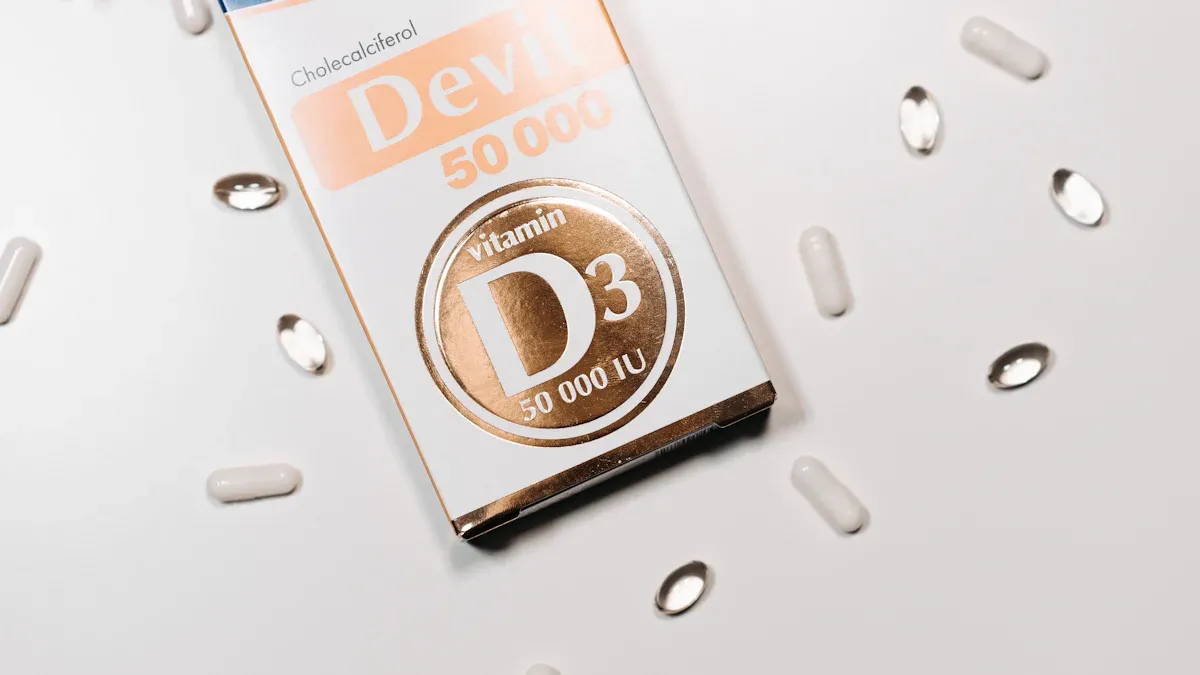
Calcium Metabolism
You need both vitamin d3 and k2 to keep your bones strong and your body healthy. When you take vitamin d3, your body absorbs more calcium from the food you eat. This process is called enhanced absorption. However, calcium alone does not always go to the right places. That is where vitamin k2 steps in. Vitamin k2 activates special proteins that guide calcium into your bones and teeth, not your arteries or soft tissues.
Tip: Think of vitamin d3 as the key that opens the door for calcium to enter your body, and vitamin k2 as the guide that shows calcium where to go.
The synergy between vitamin d3 and k2 means you get the best of both worlds. You absorb more calcium, and your body uses it to build stronger bones. This teamwork helps lower your risk of weak bones and osteoporosis.
Here is a table that shows how d3 and k2 work together in your body:
| Mechanism/Effect | Vitamin D3 Role | Vitamin K2 Role | Synergistic Outcome |
|---|---|---|---|
| Calcium Absorption | Helps your intestines absorb calcium from food and keeps blood calcium levels steady. | Activates proteins that move calcium into bones and teeth. | Ensures calcium is absorbed well and sent to bones, not soft tissues. |
| Bone Mineralization | Keeps enough calcium in your blood for bone health. | Binds calcium to bone, making bones stronger. | Leads to better bone strength and less risk of osteoporosis. |
| Prevention of Soft Tissue Calcification | Raises blood calcium, which can be risky if not controlled. | Stops calcium from building up in blood vessels and soft tissues. | Reduces risk of heart disease by keeping calcium out of arteries. |
| Stimulation of Vitamin K-dependent Proteins | May help your body make more of these proteins. | Turns on these proteins so they can work. | Boosts the activity of proteins that control where calcium goes. |
| Metabolic Effects | Helps your body use insulin and manage blood sugar. | Affects proteins linked to blood sugar control. | May give extra benefits for your metabolism and overall health. |
Clinical studies back up these benefits. For example, research with postmenopausal women shows that taking both d3 and k2 increases bone mineral density and lowers the risk of fractures. Other studies find that people who take both vitamins have better calcium absorption and stronger bones than those who take only one.
Preventing Arterial Calcification
You want calcium to stay in your bones, not your arteries. If calcium builds up in your blood vessels, it can lead to hardening of the arteries, which raises your risk for heart disease. Vitamin d3 increases calcium absorption, but if you do not have enough vitamin k2, some of that calcium may end up in the wrong places.
Vitamin k2 activates a protein called matrix Gla protein (MGP). This protein stops calcium from sticking to your artery walls. Vitamin d3 helps your body make more of this protein, but only vitamin k2 can turn it on. When you get enough of both, you lower your risk of arterial calcification.
Note: Studies show that people who take d3 and k2 together have slower buildup of calcium in their arteries. This means better cardiovascular health and a lower chance of heart problems.
Here are some important points about reducing calcification risk:
- Vitamin d3 alone can raise calcium levels in your blood, which may increase the risk of calcium building up in arteries if you lack vitamin k2.
- Taking both vitamins helps direct calcium to your bones, not your arteries.
- Clinical trials, like the Danish AVADEC trial, show that combined d3 and k2 slow the progression of coronary artery calcification.
- People with higher vitamin k2 intake have less arterial calcification and better heart health.
- Animal studies confirm that high-dose vitamin k2 prevents calcium buildup in blood vessels.
You should always aim for balance. Too much vitamin d3 without enough k2 can lead to problems. The combination of d3 and k2 supports your bones and protects your heart by keeping calcium where it belongs.
Health Benefits of D3 and K2
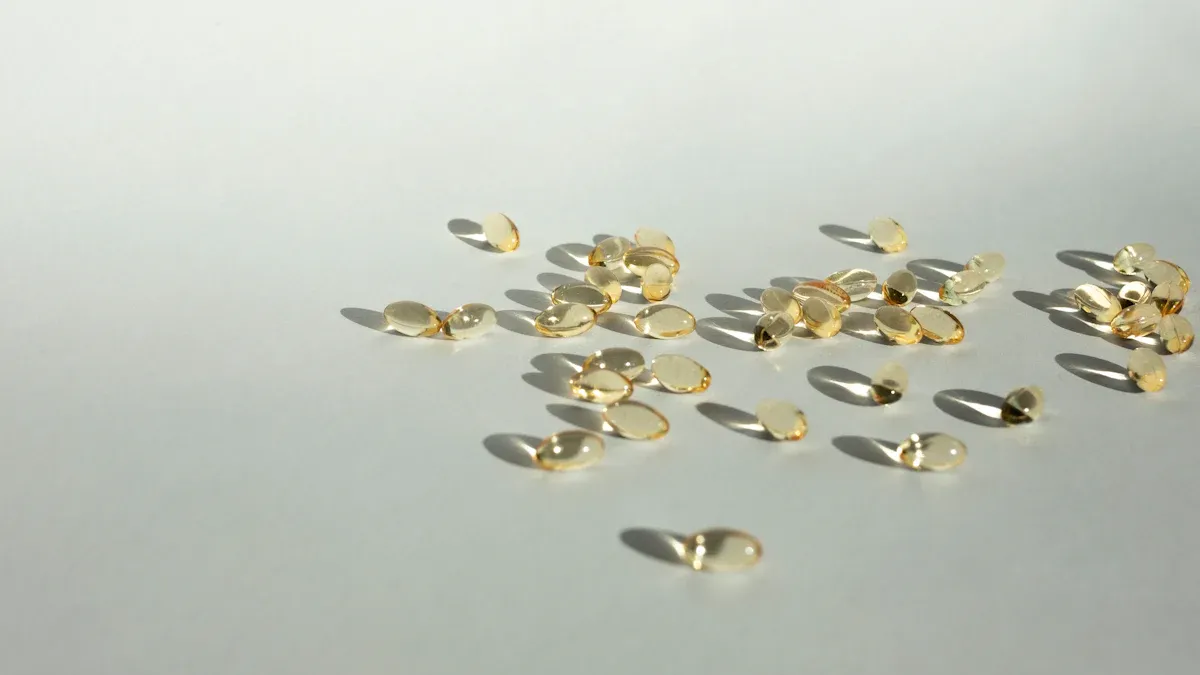
Bone Health
You want strong bones that last a lifetime. Vitamin D3 and K2 work together to give you better bone health than either one alone. Vitamin D3 helps your body absorb calcium from food. Vitamin K2 makes sure that calcium goes into your bones, not your arteries. This teamwork leads to stronger bones and a lower risk of fractures.
A clinical trial in postmenopausal women showed that taking both vitamin D3 and K2 improved bone mineral density more than taking either vitamin alone or just calcium. The table below shows how each group did:
| Group | Supplementation | Effect on Lumbar Spine BMD (L2-L4) |
|---|---|---|
| D group | Vitamin D3 alone (0.75 mcg/day) | Significant increase compared to calcium group (P < 0.05) |
| K group | Vitamin K2 alone (45 mg/day) | Significant increase compared to calcium group (P < 0.001) |
| DK group | Vitamin D3 + Vitamin K2 | Significant increase compared to calcium, D, and K groups (P < 0.0001, P < 0.05, P < 0.01 respectively) |
| C group | Calcium alone (2 g/day) | Significant decrease in BMD (P < 0.001) |
Vitamin D3 boosts calcium absorption and helps your body make proteins that need vitamin K2 to work. Vitamin K2 then directs calcium into your bones, giving you healthy bones and preventing calcium from building up in your blood vessels. Reviews in medical journals confirm that this combination gives you the best results for bone health.
🦴 If you want to keep your bones healthy and lower your risk of osteoporosis, consider the combined benefits of vitamin D3 and K2.
Heart Health
Your heart works hard every day. You can help it stay healthy by making sure calcium does not build up in your arteries. Vitamin D3 and K2 together protect your heart by guiding calcium into your bones and away from your blood vessels. This reduces the risk of arterial calcification, which can lead to heart disease.
Research shows that vitamin K2 lowers markers linked to stiff arteries. It also slows the progression of coronary artery calcification, especially in people with high calcium scores. In a large clinical trial, people who took vitamin D3 and K2 together had less buildup of calcium in their arteries than those who took a placebo, especially if they started with high levels of calcification.
| Study Aspect | Details |
|---|---|
| Study Design | Multicenter double-blinded randomized controlled trial |
| Participants | 389 randomized; 304 analyzed (male, mean age 71) |
| Intervention | Vitamin K2 (720 μg/day) + Vitamin D3 (25 μg/day) vs placebo |
| Duration | 24 months |
| Secondary Endpoint | Coronary artery calcification (CAC) progression |
| Subgroup (CAC ≥ 400 AU) | Intervention ΔCAC = 288 AU; Placebo ΔCAC = 380 AU; P = 0.047 (significant reduction) |
Vitamin D3 helps your body absorb calcium and supports your heart by lowering inflammation. Vitamin K2 activates proteins that keep calcium out of your arteries. This teamwork supports a healthy heart and may lower your risk of heart disease.
❤️ Keeping your heart healthy means making sure calcium goes to your bones, not your arteries. Vitamin D3 and K2 together help you do just that.
Immune Support
Your immune system protects you from germs and keeps you healthy. Vitamin D3 and K2 both play important roles in immune system support. Vitamin D3 helps your body make immune cells that fight off infections. It also boosts the production of natural antibiotics in your body. Vitamin K2 helps control inflammation and keeps your immune system balanced.
Vitamin D3 is made in your skin when you get sunlight, but many people do not get enough. Low vitamin D3 levels can weaken your immune system. Supplementing with vitamin D3 can help your body fight infections, including respiratory illnesses. Studies show that vitamin D3 helps your body make more dendritic and natural killer cells, which are key for immune defense.
Vitamin K2 reduces inflammation and helps control T-cell responses. This may prevent your immune system from overreacting, which can cause autoimmune problems. Some research suggests that vitamin K2 may even help protect your lungs during infections like COVID-19.
🛡️ For better immune system function and overall immunity, make sure you get enough vitamin D3 and K2. These vitamins work together to keep your immune system strong and balanced.
Mental and Mood Benefits
You may notice changes in your mood or mental sharpness if you do not get enough vitamins. Vitamin D3 and K2 both support your brain and mood. Vitamin D3 helps your brain make dopamine, a chemical that boosts your mood and helps you handle stress. Studies show that vitamin D3 supplements can improve mood and lower the risk of depression.
Vitamin K2 protects your brain cells and may reduce irritability. Some supplements combine vitamin D3 and K2 to support mental health, based on the benefits of each vitamin. While no clinical trials have tested the combination directly for mood, research shows that both vitamins are important for a healthy brain and emotional balance.
😊 Keeping your mind sharp and your mood steady may be easier when you get enough vitamin D3 and K2.
Metabolism and Weight
Your metabolism controls how your body uses energy and stores fat. Vitamin D3 and K2 help your metabolism work better. Vitamin D3 supports healthy blood sugar levels and improves how your body uses insulin. It also helps your thyroid work well, which is important for energy and weight control.
Vitamin K2 helps prevent calcium from building up in your blood vessels and may help reduce belly fat. Some studies show that taking both vitamin D3 and K2 improves insulin sensitivity and blood sugar control, especially in people with type 2 diabetes or metabolic syndrome.
- Vitamin D3 helps your body absorb calcium, supports thyroid function, and may reduce fat cell formation.
- Vitamin K2 may help reduce abdominal fat and improve blood sugar control.
- Taking both vitamins together can improve your metabolism and support healthy weight management, though more research is needed to confirm direct effects on weight loss.
⚖️ For better metabolic health and support with weight management, make sure you get enough vitamin D3 and K2.
You get the most health benefits when you take vitamin D3 and K2 together. This combination supports bone health, heart health, immune system support, mental well-being, and metabolism. By making these vitamins part of your daily routine, you help your body stay strong and healthy in many ways.
Supplementing Vitamin D3 and K2
Dosage Tips
You need the right dose of d3 and K2 to get the best results. For most adults, health experts recommend 600 to 800 IU of d3 each day. If you are over 70, you should aim for at least 800 IU daily. Some people with low vitamin D levels may need 1,500 to 2,000 IU per day. Children under 5 can take up to 35 IU per pound of body weight, while older children usually need about 400 IU daily. Adults, including pregnant and breastfeeding women, should not go over 5,000 IU per day unless a doctor says it is safe. High doses above 5,000 to 10,000 IU daily should only be used with medical supervision.
Vitamin K2, especially the MK-7 form, is usually safe at 50 to 120 mcg per day. Some studies show heart health benefits at 180 to 360 mcg daily. K2 does not have a set upper limit, and even high doses have been used safely in research. Most people do not have side effects, but you might notice mild stomach upset or a skin rash.
| Age Group | Male Dosage (IU) | Female Dosage (IU) | Pregnancy/Lactation Dosage (IU) |
|---|---|---|---|
| 0–12 months | 400 | 400 | N/A |
| 1–13 years | 600 | 600 | N/A |
| 14–18 years | 600 | 600 | 600 |
| 19–50 years | 600 | 600 | 600 |
| 51–70 years | 600 | 600 | N/A |
| Over 70 years | 800 | 800 | N/A |
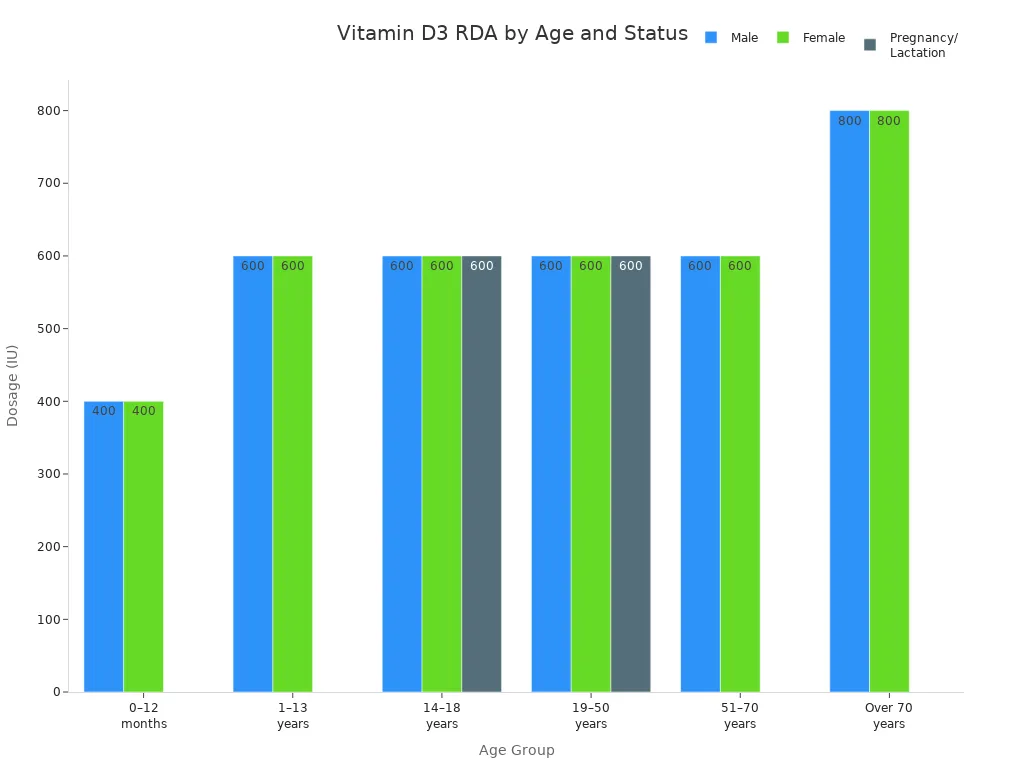
Tip: Do not take more than 4,000 IU of d3 daily unless your doctor tells you to. Too much d3 can cause high calcium levels, kidney problems, or stomach issues.
Choosing Supplements
You want to pick supplements that your body can use well. For d3, microencapsulated forms give the best absorption, followed by oil-based types. Micellized d3 is less effective. For K2, look for the MK-7 form. MK-7 stays in your blood longer and works better for bone and heart health than MK-4. Many brands offer combined d3 and K2 supplements, making it easy to get both in one dose.
Note: If you take blood thinners like warfarin, talk to your doctor before using K2. K2 can affect how these medicines work.
Who Should Supplement
You may need d3 and K2 supplements if you spend little time in the sun, are older, or have darker skin. Nursing home residents, people with obesity, and those with vitamin d deficiency often need extra support. Children, pregnant women, and people with certain health problems like chronic kidney disease or osteoporosis may also benefit. If you take blood thinners, ask your doctor before starting K2.
| Medical Condition / Context | Vitamin D3 Supplementation | Vitamin K2 Supplementation | Contraindications / Cautions |
|---|---|---|---|
| Chronic Kidney Disease (CKD) | Used for low bone density and hormone balance | Helps reduce artery stiffness and supports bone health | Avoid K2 with warfarin or similar blood thinners |
| Osteoporosis | Improves bone density | Supports bone health | Caution with vitamin K antagonists |
| Cardiovascular Disease Risk | May increase calcium absorption | Directs calcium to bones, not arteries | Caution with warfarin-type drugs |
📝 Always check with your healthcare provider before starting new supplements, especially if you have health conditions or take medications.
You gain more health benefits when you take vitamin D3 and K2 together. This combination helps your bones stay strong, keeps your heart healthy, and supports your immune system. Studies show that using both vitamins improves bone density, lowers fracture risk, and helps control blood sugar better than taking either alone.
For best results, choose a supplement with both D3 and K2, and talk to your doctor before starting. Take charge of your health and give your body the support it needs every day!
FAQ
Can you take vitamin D3 and K2 together every day?
Yes, you can take vitamin D3 and K2 together daily. Many supplements combine both. This helps your body use calcium better and supports bone and heart health. Always follow the dosage on the label or ask your doctor.
What foods give you vitamin K2?
You find vitamin K2 in foods like natto (fermented soybeans), hard cheeses, egg yolks, and chicken. Natto has the highest amount. Most people do not eat enough K2-rich foods, so supplements can help.
Do you need calcium supplements with D3 and K2?
You usually do not need extra calcium if you eat a balanced diet. Vitamin D3 and K2 help your body use the calcium from food. Too much calcium from supplements can cause problems, so ask your doctor before adding more.
Are there side effects from taking D3 and K2?
Most people do not have side effects when taking D3 and K2 at recommended doses. Rarely, you may notice mild stomach upset or skin rash. High doses of D3 can cause high calcium levels. Always use the right amount.
Who should avoid vitamin K2 supplements?
People who take blood thinners like warfarin should avoid vitamin K2 unless their doctor says it is safe. K2 can change how these medicines work. Always talk to your healthcare provider before starting new supplements.

Poseidon
Master of Nutritional Epidemiology, University of Copenhagen, Herbal Functional Nutrition Researcher
Focus: The scientific application of natural active ingredients such as Tongo Ali, Horny Goat Weed, and Maca to sexual health and metabolic regulation.
Core Focus:
Men: Use a combination of Tongo Ali (an energizing factor) + Maca (an energy reserve) to improve low energy and fluctuating libido.
Women: Use a combination of Horny Goat Weed (a gentle regulator) + Maca (a nutritional synergist) to alleviate low libido and hormonal imbalances.
Stressed/Middle-Aged Adults: This triple-ingredient synergy supports metabolism, physical strength, and intimacy.
Product Concept:
Based on traditional applications and modern research (e.g., Tongo Ali promotes testosterone-enhancing enzyme activity, and icariin provides gentle regulation), we preserve core active ingredients and eschew conceptual packaging—using natural ingredients to address specific needs.
Simply put: I'm a nutritionist who understands "herbal actives." I use scientifically proven ingredients like Tongo Ali, Epimedium, and Maca to help you make "sexual health" and "nutritional support" a daily routine.
